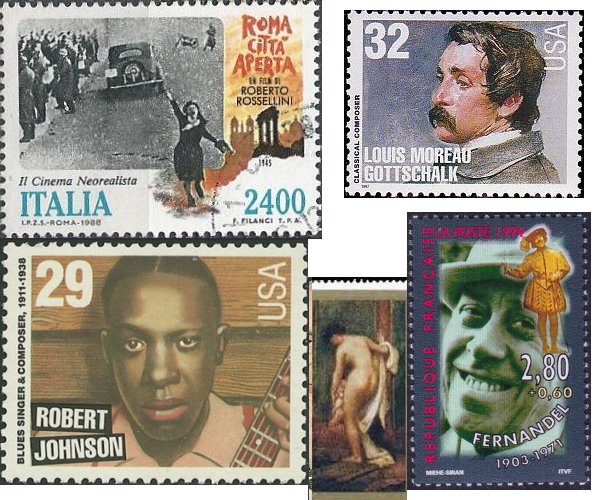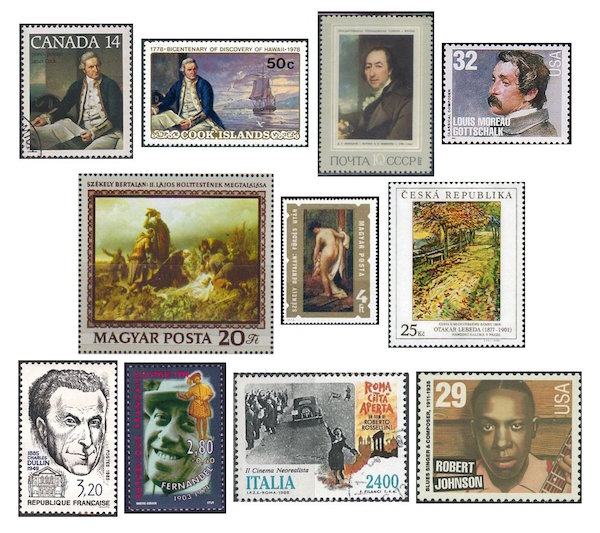The Arts on the Stamps of the World — May 8
An Arts Fuse regular feature: the arts on stamps of the world.

By Doug Briscoe
May 8 gives us three painters, a Russian journalist, an American composer/pianist, a theater manager and an actor from France, Italian director Roberto Rossellini, and blues singer Robert Johnson.
We begin with an English portrait painter whose most familiar work is of a person much more famous than himself. Nathaniel Dance (8 May 1735 – 15 October 1811) studied under Francis Hayman and in Italy, where he met Angelica Kauffman. He began painting genre pictures with classical or historic themes. On his return home Dance turned to portraits and painted King George III and Queen Charlotte, the actor David Garrick, and Captain James Cook (c1775). We see the Cook portrait in stamps from Canada and, of course, the Cook Islands. Dance was subsequently (1800) created a baronet and became Sir Nathaniel Dance-Holland. He was one of the founding members of the Royal Academy in 1768 and after 1790 entered politics as an MP.
We’ve already, and indeed recently, seen the stamp for writer Nikolay Novikov (8 May [O.S. 27 April] 1744 – 12 August [O.S. 31 July] 1818), when we paid tribute to portaitist Dmitry Levitsky on April 17th. Novikov is seen as the first important Russian journalist, assuming the editorship of the Moscow Gazette and starting satirical journals of his own, likely with England’s Tatler and Spectator as models. He established a press that handled perhaps a third of all published Russian books of the day. His social criticisms were received with amusement by Catherine the Great, who even started her own journal specifically to respond to his articles. But that all changed with the French Revolution. Suddenly Catherine’s funny bone was no longer tickled, his press was confiscated, and the poor man was imprisoned without trial for fifteen years. (Good thing Trump doesn’t know anything about history—it might give him, gulp, ideas.)
Today is also the birthday of American composer Louis Moreau Gottschalk (1829 – December 18, 1869). He was born in New Orleans and exposed to a variety of cultural influences, which were reflected in his music. He had great success playing his own works in Europe, the US, the Caribbean, and South America and became the most popular pianist in the New World. By his own estimate he had travelled 95,000 miles and given 1100 recitals. He contracted malaria and died in Rio, probably from an overdose of quinine, at the age of 40.
Another history and portrait painter was the Hungarian Bertalan Székely (8 May 1835 – 21 August 1910). A student at the Vienna Academy of Fine Arts, he taught art in his hometown of Kolozsvár for a while, then moved on to Munich and finally to Pest, where he was accepted as one of the first teachers at the new Hungarian Royal Drawing School (now the Hungarian University of Fine Arts), an institution he directed from 1902 to 1905. After concentrating on historical paintings like Discovery of the Body of Lajos [Louis] II (1860), recalling the Battle of Mohács of 1526, Székely worked on portraits and female figures, as with his After the Bath (can’t find a date for this), then landscapes. He became interested in the early photographic studies of movement made by Edweard Muybridge and Étienne-Jules Marey and undertook some of his own experiments in this area.
Our last painter for the day is the Czech landscape and figure artist Otakar Lebeda (8 May 1877 – 12 April 1901). He attended the Prague Academy of Fine Arts from the age of fifteen. Even the Czech language Wikipedia page doesn’t have much more to say about him. The reason for his suicide by gunshot at age 23 remains unknown. The stamp shows his piece The Way to Bechyně Castle, painted in 1899.

Charles Dullin (1885 – 11 December 1949) and Fernand Contandin (1903 – 26 February 1971), better known as Fernandel, were both French actors, but Dullin was more important as a theater manager, director, and teacher whose workshop for young actors had a lasting effect, while Fernandel had a face that was made for comedy. He played Don Camillo in a series of five French-Italian co-productions made between 1952 and 1965, and he played David Niven’s coachman in his first Hollywood venture, Around the World in 80 Days (1956).
Still in the world of film, we salute Roberto Rossellini (8 May 1906 – 3 June 1977). As a child he had free access to his father’s movie theater (the first one in Rome), a good start for his profession. He was a friend of Mussolini’s son, and that didn’t hurt his career either. Rossellini made his first documentary in 1937 and his first feature in 1941. When Italy left the war, Rossellini immediately made his antifascist masterpiece Roma città aperta (Rome, Open City, 1945), cited on the 1988 stamp, which signaled his embarkation into neorealism. His scandalous affair with Ingrid Bergman led eventually to marriage and the birth of actress Isabella Rossellini. He left a canon of some forty films.
The birthdate of Robert Leroy Johnson is not entirely certain, but May 8, 1911 is one possibility. Both of his wives died in childbirth, and after the second tragedy Johnson became an itinerant musician. He made the first of his 29 recordings (not including alternate takes) in 1936. It has been said that Johnson was murdered with poison by a jealous husband. He was 27 when he died on August 16, 1938. Greatly admired by such figures as Eric Clapton, Bob Dylan, and Keith Richards, Robert Johnson is celebrated as one of the greatest of guitar technicians and a singer of tremendous emotional power.
American writer and critic Edmund Wilson (May 8, 1895 – June 12, 1972) is deserving of a stamp, methinks. Thomas Pynchon (born May 8, 1937) may get one someday. And a very happy 91st birthday to the wonderful Sir David Attenborough.
A graduate of the University of Massachusetts with a B.A. in English, Doug Briscoe worked in Boston classical music radio, at WCRB, WGBH, and WBUR, for about 25 years, beginning in 1977. He has the curious distinction of having succeeded Robert J. Lurtsema twice, first as host of WGBH’s weekday morning classical music program in 1993, then as host of the weekend program when Robert J.’s health failed in 2000. Doug also wrote liner notes for several of the late Gunther Schuller’s GM Recordings releases as well as program notes for the Boston Classical Orchestra. For the past few years he’s been posting a Facebook “blog” of classical music on stamps of the world, which has now been expanded to encompass all the arts for The Arts Fuse.
